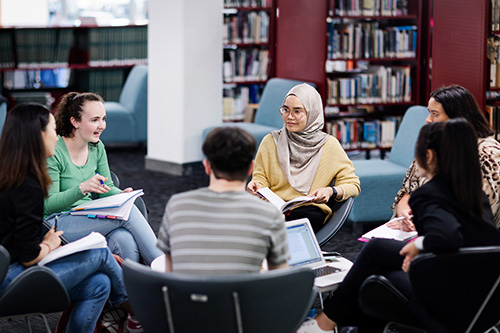Counselling and Guidance
With the Postgraduate Diploma in Education (Counselling and Guidance) you’ll develop knowledge in effective counselling and guidance practice and roles. Already in a counselling and guidance role? Considering moving into this field? This postgraduate diploma will advance your learning.
 Experience a Postgraduate Diploma programme with:
Experience a Postgraduate Diploma programme with:
- Te Tiriti o Waitangi at the centre.
- An emphasis on the integration of contemporary Māori and Western counselling, guidance and wellbeing theory.
- Knowledge and application of ethical principles embedded in the counselling Code of Ethics across all aspects of professional counselling and guidance practice.
- Counselling courses that include effective, evidence-based ways of working with Whanau/family, couples, and adolescents and young people in the context of the community as a whole.
- A teaching team who has extensive, practice-based counselling experience and expertise
- A commitment to embedding mātauranga Māori education including tikanga and protocols) and supporting and enriching every student’s journey. He waka eke noa, he whānau aroha noa, he kaupapa puta noa
This diploma is also the first step if you’re thinking of taking the advanced professional qualification, Master of Counselling Studies. In doing so, you will gain professional membership to practise as a counsellor when you’ve completed the Master of Counselling Studies.
Please note that the Postgraduate Diploma in Counselling and Guidance does not qualify you to be a counsellor.
What are the entry requirements?
To enter the Postgraduate Diploma in Counselling and Guidance you will:
- have been awarded or qualified for the Bachelor of Education, or equivalent or
- have been awarded or qualified for any other bachelor’s degree or equivalent, and hold a professional qualification in teaching or
- have been awarded or qualified for any other bachelor’s degree or equivalent and have professional experience relevant to counselling and guidance.
What is the programme structure?
Compulsory courses (120 credits)
|
Course number & title * |
Description |
|---|---|
|
253750 Counselling Theory |
A study of the theoretical bases of counselling. The course examines the place of counselling in society, its philosophical foundations, empirical status and major principles. Particular emphasis is given to selected approaches. |
|
253755 Culture and Counselling |
An examination of the significance of culture in counselling. A multicultural perspective is adopted but with particular attention to the context in Aotearoa/New Zealand. |
|
253753 Guidance in Education |
A study of guidance in educational settings. Attention is given to the philosophical foundations of guidance, its social implications, organisation and roles. Intervention procedures for individuals and groups are examined. |
|
253754 Family and Couples Counselling |
A study of the theoretical bases of family and couples counselling. Attention is given to the concepts of 'family' and 'couple' and to systems theory. The processes of counselling families and couples are examined with regard to various approaches. |
* All courses listed are 30 credits
How long does it take to complete this programme?
A Postgraduate Diploma in Counselling and Guidance requires 120 credits.
If you study full-time, you’ll take 120 credits per year or 60 credits per semester. You can also opt to study part-time.
This qualification normally starts in Semester One because the core courses are double semester (i.e. February - October).
Where is this programme available?
The Postgraduate Diploma in Counselling and Guidance is a fully online programme which provides flexible learning options for all students regardless of their location throughout the country. The programme is open to international students studying online from outside New Zealand.
Who should you contact?
Dr Raewyn Laurenson Elder
Programme coordinator, Counselling and Guidance
R.LaurensonElder@massey.ac.nz
The Postgraduate Diploma in Counselling and Guidance is a good fit if you:
- want to gain recognition and further develop your professional capabilities
- have an undergraduate degree
- are thinking of doing a Master of Counselling Studies to complete a professional counselling qualification.
